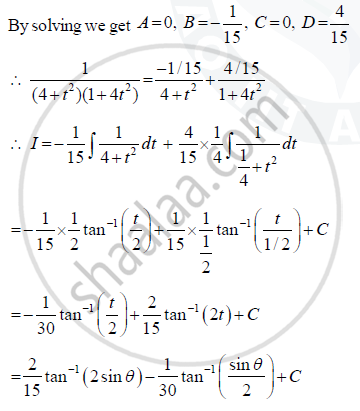Advertisements
Advertisements
Question
Find `int (cos theta)/((4 + sin^2 theta)(5 - 4 cos^2 theta)) d theta`
Solution


APPEARS IN
RELATED QUESTIONS
Find `int dx/(5 - 8x - x^2)`
Evaluate `int (cos 2x + 2sin^2x)/(cos^2x) dx`
Evaluate : \[\int\limits_0^\frac{\pi}{4} \tan x dx\] .
Evaluate : \[\int\limits_0^\pi \frac{x \tan x}{\sec x + \tan x}dx\] .
Evaluate: `int ("sin 2x")/((1 + "sin x")(2 + "sin x")) "dx"`
Prove that `int_0^"a" "f(x)" "dx" = int_0^"a" "f"("a"-"x")"dx"` ,and hence evaluate `int_0^1 "x"^2(1 - "x")^"n""dx"`.
Evaluate the following:
`int x/(sqrt(x) + 1) "d"x` (Hint: Put `sqrt(x)` = z)
Evaluate the following:
`int sqrt(("a" + x)/("a" - x)) "d"x`
Evaluate the following:
`int x^(1/2)/(1 + x^(3/4)) "d"x` (Hint: Put `sqrt(x)` = z4)
Evaluate:
`∫ log_10 "x dx"`
The value of the integral `int_(-1)^2 [x] dx` is
`int (sin^8x - cos^8x)/(1 - 2sin^2x cos^2x) dx` is equal to
`int_0^oo (dx)/((x^2 + a^2)(x^2 + b^2))` is
Evaluate: `int_0^(pi/2) cosx/(( cos x/2 + sin x/2)^3) dx`
If `d/dx f(x) = 2x + 3/x` and f(1) = 1, then f(x) is ______.
